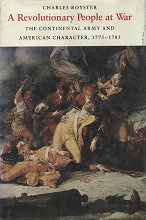
ROYSTER : A revolutionary people at war (fülszöveg)
Americans' ideals of national achievement and of individual conduct were both shaped and tested in the War for Independence. In sustaining the army that was needed to win that war, Americans faced the most rigorous test of their capacity to live for a revolutionary vision of independence and liberty. In this powerful study Charles Royster examines the relationship of Americans' national character and the military demands of the Revolutionary War to provide a new perspective on the American Revolution and its legacy.
In 1775 many Americans believed that their mission in fighting the Revolutionary War was no less than the creation of a promised land. But liberty would survive for posterity only if the American people showed themselves to be worthy defenders who embodied an ideal of piety, discipline, and native courage that surpassed ordinary human achievement. Later, when Americans measured their wartime conduct against their unattainable ideal, they saw failings that produced deep anxiety and prolonged tension.
Military ardor was in popular vogue at the beginning of the Revolutionary War, but as Americans endured the eight-year struggle that few had expected, they learned that neither living nor dying in the cause of liberty proved so uncomplicated as the spirit of 1775 had announced. Captain Joseph Jewett found it so as he took thirty-six hours to die of bayonet wounds in his chest and stomach after the Battle of Long Island. Faith Trumbull Huntington found it so when she succumbed to a deep, ultimately suicidal depression after her husband and brothers went to the war. Even General Washington found it so when he faced the hostile critics who expected him to transform the undisciplined energy of a citizen army into a force that could quickly smash the British tyrants.
Americans wanted a quick victory partly because they feared the army as an institution and believed that professional soldiers were dangerous mercenaries. Their distrust was returned, for the soldiers of the Continental Army suffered materially and spiritually from the public's neglect. Hostility between the people and their army grew during the war, but the Continentals were able to buttress the faltering rage militaire of 1775 with a new spirit of military discipline. Led by the flamboyant Baron von Steuben and the constant Washington, the army was strengthened by bonds of revolutionary patriotism, professional loyalty, and pride of achievement.
In spite of their accomplishments, however, Continental veterans found that victory did not bring the recognition that they had been promised. Instead, Americans reclaimed the war from the army to whom they had entrusted it and bequeathed to posterity a legacy of revolutionary glory that the lives of citizens and soldiers alike had often belied.
This disturbing and moving book tells us much about the mental processes and emotional crises that Americans faced in their first national war. Royster ranges imaginatively outside the traditional techniques of analytical historical exposition to build his masterly portrait of how individuals and a populace at large faced their time of trial. The lessons of his story are as vital today as they were in the revolutionary era.